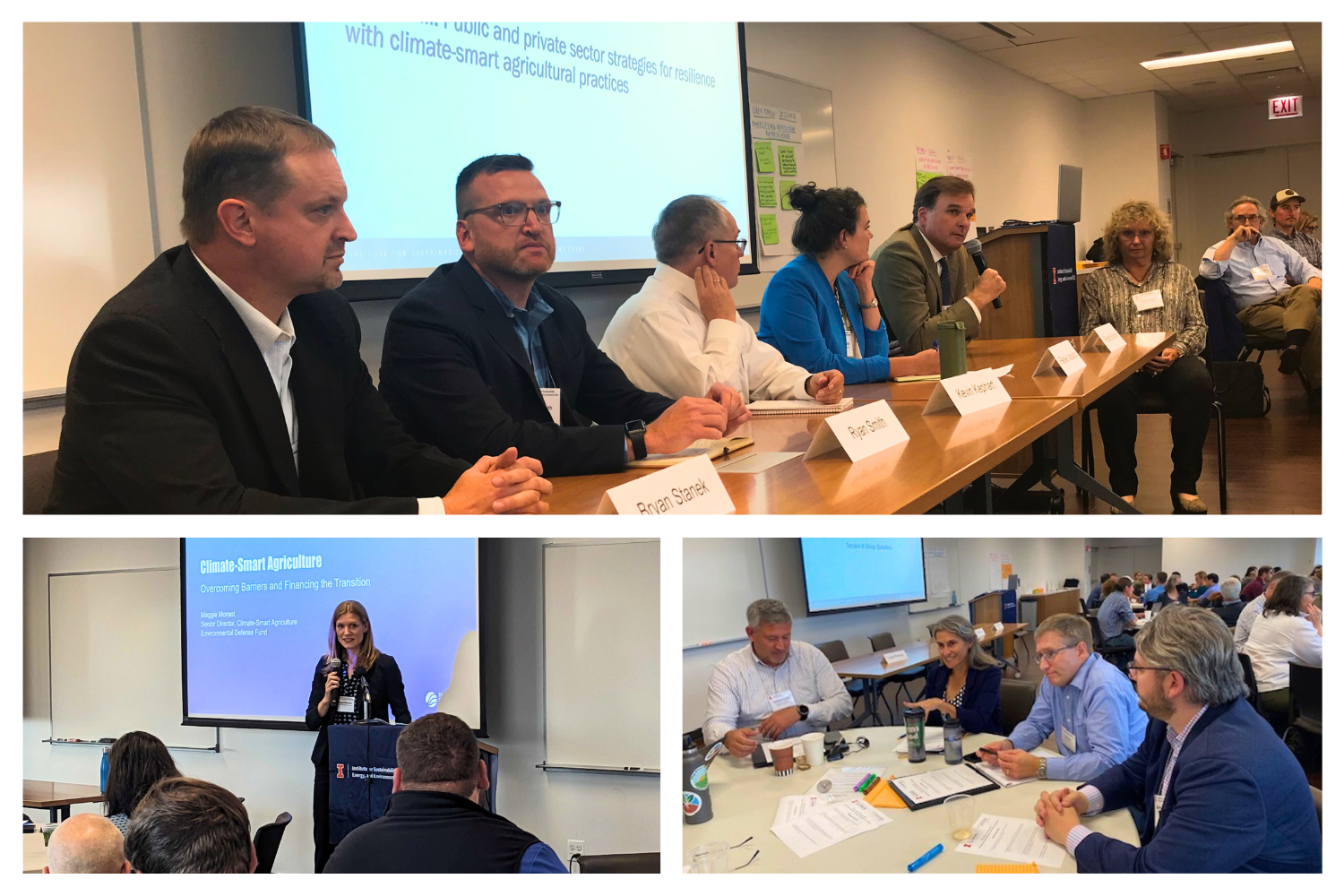Critical Climate-Smart Agriculture Discussions in the Midwest

AFT Joins Agricultural Leaders in a Critical Conversation on Climate-Smart Agriculture Resiliency in the Midwest
In mid-September, staff from American Farmland Trust joined representatives from the University of Illinois to host a Critical Conversation on the use of climate-smart agriculture practices and resiliency of the Midwest. The event was the fifth conversation hosted by the Institute for Sustainability, Energy and the Environment, and brought together diverse stakeholders from across the agriculture industry.
The event kicked off with a presentation by Maggie Monast of the Environmental Defense Fund highlighting both the threat of climate change to agriculture and the unique opportunities to finance the transition to climate-smart practices. One of the biggest opportunities included the influx of $19B from USDA through the Inflation Reduction Act, investments from agricultural corporations, and innovative incentives like reduced interest rates on operating loans for farms applying nitrogen within science-based safe zones.
Questions and Answers from the Panel
The event continued by convening more than 80 farmers and professionals from across the agricultural industry engaged in thought provoking discussions. Participants heard from three panels comprised of leaders like Randy DeSutter, Farmer and Board Member of the National Corn Growers Association; Dr. Linday Prokopy, Professor at Purdue University; Cindy Nickerson, Deputy Chief Economist at USDA; Ryan Smith, Senior Manager of Regenerative Ag at Danone; and Robert Bonnie, Under Secretary for Farm Production and Conservation at USDA. After each panel, participants engaged in conversation tackling questions like:
- What do you think about the resilience of the current agricultural practices in the face of future changes in climate, industry, consumer habits / demands, etc.? To what extent are they climate-smart?
- Would consumers be interested in differentiated commodities that are produced with climate-smart practices from those commodities that are not?
- What are the competitive advantages or disadvantages to farmers using climate-smart agriculture practices? How are farmers in the region managing the disadvantages to stay competitive?
- Assuming there is adequate consumer demand for climate-smart crops and products, how does that demand get to the producer? Do you see that demand driving change at the farm level?
- What policies would be effective to incentivize farmers to adopt climate-smart practices?
Both farmers and non-farmers identified cost, equipment, and labor as challenges to implement climate-smart practices, and were hopeful that the more than 70 of the available cost-share programs and companies providing custom services may help overcome those challenges.
Lack of technical assistance may be the greatest barrier to adoption of climate-smart. This doesn’t just apply to limited staff at the local NRCS office, it applies to limited conservation expertise available from ag retailers, and underscores the importance of farmer-to-farmer learning opportunities. Farmers learn from other farmers, and AFT is actively working to support farmer-to-farmer education in the upcoming Farm Bill.
Closing Knowledge Gaps and Next Steps
A third challenge identified was the high rate of rented land. In Illinois, nearly 70% of cropland is managed by farmers who do not own the land, and owner-tenant relationships are complex. Short-term leases hinder adoption of climate-smart practices that may take years to show a return. Competition for farmland can limit creativity and innovation, with farmers reluctant to try new practices. Landowners may not have farming experience or the knowledge needed to talk about conservation with their tenant farmer. While all of these are potential barriers, studies show that, and engaging landowners in conversations about conservation and climate-smart agriculture should be a priority.
Lastly, the participants were asked to imagine that we get this right. Would there be more farmers? Would cropping systems be more diverse? What new businesses might be formed? What new stories would be told? We’ll be sharing ideas with farmers, partners, and all of you in the coming months, and I invite you to share your vision for a more resilient Midwest and climate-smart agriculture with me. Send an email to jbrokish@farmland.org.
Watch our Midwest Region mission overview below!

